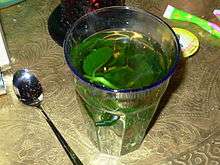Peppermint tea

Peppermint tea is a herbal tea made from an infusion of peppermint (Mentha piperita). It is sometimes called mint tea. It is caffeine-free. A tea made from blending peppermint and spearmint (Mentha spicata) leaves is referred to as doublemint tea.
Health benefits and concerns
Though there have been few human clinical trials on the health benefits or risks of peppermint tea,[1] there is some evidence that peppermint-based products (and potentially, the tea) have healing effects because of the peppermint oil or menthol that it contains, and that treatment using orally ingested peppermint oil will relieve the symptoms of irritable bowel syndrome.[2] The oil of peppermint has also been shown to be an effective antispasmodic during colonoscopy and upper gastrointestinal endoscopy.[3] Peppermint tea is seen as a carminative (helps with the movement of gas in the body) helping with cramping and stomach discomfort[4]
However, peppermint has properties that may relax the lower esophageal sphincter, allowing the contents of the stomach to move upwards into the esophagus. For this reason, patients with gastroesophageal reflux disease (GERD) are advised to avoid peppermint, at least in theory. On the other hand, precisely because it calms and relaxes the muscles along the intestinal tract, thus reducing spasms, peppermint may have beneficial effects in treating diarrhea[5] and colic.[6] Peppermint also seems to be effective in relieving intestinal gas and indigestion.[7]
References
- ↑ McKay, Diane L.; Blumberg, Jeffrey B. (2006). "A review of the bioactivity and potential health benefits of peppermint tea (Mentha piperita L.)". Phytotherapy Research. 20 (8): 619–33. doi:10.1002/ptr.1936. PMID 16767798.
- ↑ Cappello, G.; Spezzaferro, M.; Grossi, L.; Manzoli, L.; Marzio, L. (2007). "Peppermint oil (Mintoil®) in the treatment of irritable bowel syndrome: A prospective double blind placebo-controlled randomized trial". Digestive and Liver Disease. 39 (6): 530–6. doi:10.1016/j.dld.2007.02.006. PMID 17420159.
- ↑ Yamamoto, Natsuyo; Nakai, Yousuke; Sasahira, Naoki; Hirano, Kenji; Tsujino, Takeshi; Isayama, Hiroyuki; Komatsu, Yutaka; Tada, Mimoru; Yoshida, Haruhiko; Kawabe, Takao; Hiki, Naoki; Kaminishi, Michio; Kurosaka, Hanzo; Omata, Masao (2006). "Efficacy of peppermint oil as an antispasmodic during endoscopic retrograde cholangiopancreatography". Journal of Gastroenterology and Hepatology. 21 (9): 1394–8. doi:10.1111/j.1440-1746.2006.04307.x. PMID 16911682.
- ↑ "Health Benefits of Peppermint Tea | Organic Facts". www.organicfacts.net. Retrieved 2016-12-01.
- ↑ Alam, MS; Roy, PK; Miah, AR; Mollick, SH; Khan, MR; Mahmud, MC; Khatun, S (2013). "Efficacy of Peppermint oil in diarrhea predominant IBS - a double blind randomized placebo - controlled study". Mymensingh Medical Journal. 22 (1): 27–30. PMID 23416804.
- ↑ Alves, João Guilherme Bezerra; de Brito, Rita de Cássia Coelho Moraes; Cavalcanti, Telma Samila (2012). "Effectiveness of Mentha piperita in the Treatment of Infantile Colic: A Crossover Study". Evidence-Based Complementary and Alternative Medicine. 2012: 981352. doi:10.1155/2012/981352. PMC 3403674
 . PMID 22844342.
. PMID 22844342. - ↑ Ehrlich, Steven D. (July 6, 2014). "Peppermint". Complementary and Alternative Medicine Guide. University of Maryland Medical Center. Retrieved August 15, 2016.
Further reading
- Herro, Elise; Jacob, Sharon E. (2010). "Mentha piperita (peppermint)". Dermatitis. 21 (6): 327–9. PMID 21144345.
- Keifer, David; Ulbricht, Catherine; Abrams, Tracee Rae; Basch, Ethan; Giese, Nicole; Giles, Mary; Kirkwood, Catherine DeFranco; Miranda, Michelle; Woods, Jen (2007). "Peppermint (Mentha piperita): an evidence-based systematic review by the Natural Standard Research Collaboration". Journal of Herbal Pharmacotherapy. 7 (2): 91–143. doi:10.1080/J157v07n02_07. PMID 18285310.
- Fiocco, Daniela; Fiorentino, Daniela; Frabboni, Laura; Benvenuti, Stefania; Orlandini, Giulia; Pellati, Federica; Gallone, Anna (2011). "Lavender and peppermint essential oils as effective mushroom tyrosinase inhibitors: a basic study". Flavour and Fragrance Journal. 26 (6): 441–6. doi:10.1002/ffj.2072.